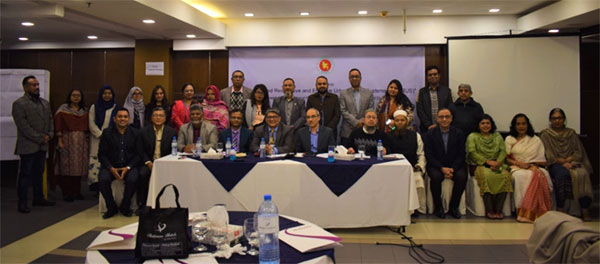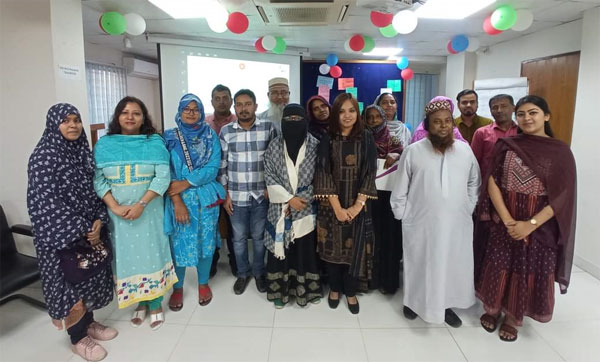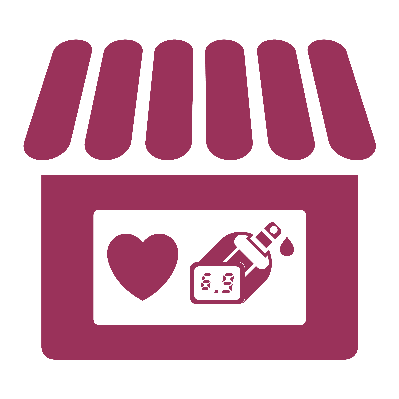CHORUS is a Research Programme Consortium that brings together health researchers from South Asia, West Africa, and the UK. CHORUS works with communities, health professionals and city level decision makers to strengthen the urban health system, especially for the urban poor.
ARK Foundation is currently implementing three projects under CHORUS. Project 1 aims to strengthen service delivery, health workforce and health information system at urban primary health care facilities to manage essential NCDs. To meet this aim, the study has three linked phases.

Co-Creation workshop with key stakeholders from different ministries and development partners
Phase one aims at understanding the existing NCD management system at urban primary health care facilities, through literature review, analysis of secondary data, interviews of policy makers, health workers, and urban slum dwellers, and data were analysed using the WHO Health System Building Blocks framework. Several gaps were found within the urban primary health care systems in terms of NCD management, including unavailability of NCD guidelines across urban primary health care facilities, lack of NCD training among workforce of these centres, and absence of an NCD health information system within the system.
Findings from phase one then led to the second phase which involved health facility assessment of urban primary health care centres and constant engagement with policy makers, health care personnel and urban dwellers, especially the poor. Through this process potential interventions for gaps were identified which were:
- Ensuring availability of the “National Protocol for Management of High Blood Pressure and Diabetes at Primary Health Care Settings” at urban primary health care facilities,
- To train urban primary health care workforce on the protocol, and
- Introducing “Simple App” which is a mobile based application to record NCDs, and an NCD register at the facilities.
The third phase aimed at implementing the identified interventions at urban primary health care facilities. In order to achieve the goal, 16 urban primary health care facilities were selected which have equally been allocated to intervention and control groups. Implementation of the intervention would be evaluated using the RE-AIM (Reach, Effectiveness, Adoption, Implementation, Maintenance) framework, and involve a mix of methods such as observations, knowledge score assessment and interviews.

Community Advisory Panel (CAP) meeting with Community members
Project 2 aims to design and evaluate an appropriate strategic purchasing model for Bangladesh’s urban primary health care system and also to develop a guideline for undertaking strategic purchasing along with the capacity strengthening of purchasers in Urban Bangladesh.
To meet this aim, a mixed method study is being conducted which will use qualitative (rapid reviews, key informant interviews, in-depth interviews, focus group discussions, and consultation workshops), quantitative (Discrete Choice Experiment, secondary data analysis, cost and impact evaluation) and participatory methods (transect walk and photo voice). The study is being conducted by following 5 steps, each with several activities to address the study objectives.
Step 1 of the study aimed to understand the current situation of strategic purchasing in Bangladesh’s urban primary health care context. For this, 20 Key Informant Interviews (KII) have been conducted with policymakers from both the Ministry of Health and Family Welfare and the Ministry of Local Government, Rural Development and Cooperatives, development partners, urban health experts, and other relevant stakeholders. This qualitative exploration attempted to include all the existing urban primary health care models in the country.
Step 2 of the study focuses on understanding the purchasing needs of the urban community. This step will involve both qualitative interviews and participatory research methods. For IDIs and FGDs, people from urban areas, especially the poor, marginalised (physically and mentally disabled), and transgender community will be selected.
In step 3 of the study, the aim is to develop an appropriate model for purchasing primary health care in urban areas.
Subsequently, step 4 will attempt to address the capacity gaps of the purchasers.
And step 5 is related to costing and evaluating purchasing models as well as strengthening the capacity of purchasers.



